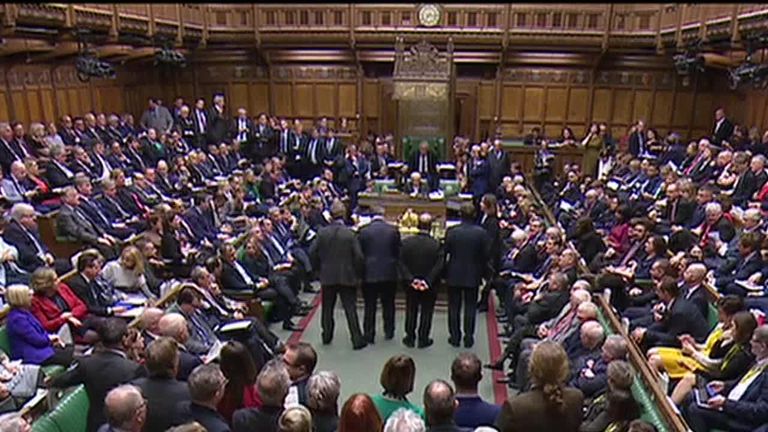Theresa May has the Brexiteers where she wants them
Sky News' political editor looks at what awaits Theresa May after a historic week in the Commons capped by a Brexit delay.
Friday 15 March 2019 12:10, UK
After a historic week in the Commons that saw MPs reject a no-deal Brexit, the bookend move to formally back a delay may have seemed a little less dramatic.
But the impact of that final vote will be far more profound.
It is no longer government policy to leave the EU on 29 March - a date described in hallowed rhetoric up until a week ago that is now no longer the target Brexit date.
Because the government will now seek an extension at least until the end of June.
The only way it will not happen is if the EU27 decide to inflict a no-deal divorce on a country that has asked to rule it out.
Once EU leaders agree a date, all that would be required to confirm the change is for a UK minister to update current legislation to include it.
It will require a statutory instrument - a specific technical change to a law - approved by a simple Commons majority.
Thursday's vote starting that process was passed by a majority of 211.
Less noticed was that, at the start of the debate, the prime minister's de-facto deputy David Lidington announced a detailed set of preparations being made for another, longer type of extension.
Should Theresa May's withdrawal agreement pass, she will ask for a short extension until 30 June to complete the process of ratification.
But if no deal has been signed off by that stage she will seek an open-ended extension, with space for "indicative votes" on different Brexit options over the first two weeks in April.
She would also have to approve by 12 April whether Britain will participate in the European Parliament elections in May.
Once an extension is approved, there is no reason too why the prime minister might not continue testing MPs' support for her deal.
The absolute hard deadline for her deal will be in under a month's time - just before this session of the European Parliament ends.
But in the first instance Mrs May has the Brexiteers where she wants them.
They face a choice - of either Brexit on the prime minister's terms within days or a softer Norway-style Brexit forced by the Commons' indicative votes, participation in the European Parliament elections, and the chance of a referendum.
What could save her is the chance of redrafted legal advice from Attorney General Geoffrey Cox.
But getting here has led to a breaking of the promise to leave on 29 March.
The detail of the votes on Thursday was simply astonishing: Eight Cabinet ministers voting against their prime minister in a free vote.
Theresa May's choice of an extension only passing on opposition votes, three in every 5 Tory MPs voting against her.
The Brexit Secretary himself, who will enact this policy, selling it to the Commons, commending his statement to the House, and then immediately voting against it.
There was some relief in government that it did not lose control of the order paper to rebels led by Hilary Benn - though only by two votes.
And at the thumping defeat of the TIG's sheepish attempt to get a referendum on the agenda, against the advice of the People's Vote campaign.
Respite beats humiliation, but Thursday was just a timeout on the parliamentary difficulties.
The Cooper-Boles-Letwin-Benn rebels are now a whisker away from winning. They will hang further amendments from next week's anticipated efforts to pass the meaningful vote.
The Speaker is even toying with the idea of refusing these repeated rounds of retrying the prime minister's Brexit deal in the Commons.
Undoubtedly the clock has not yet been reset - it is subject to the EU's help at the summit later next week
The size of the challenge has not, also.
Ultimately passing motions of this week's importance on opposition votes against several of your Cabinet is unstable and unsustainable.
But it has created a platform for one last throw of the dice.








